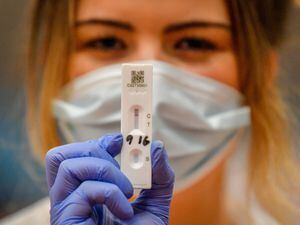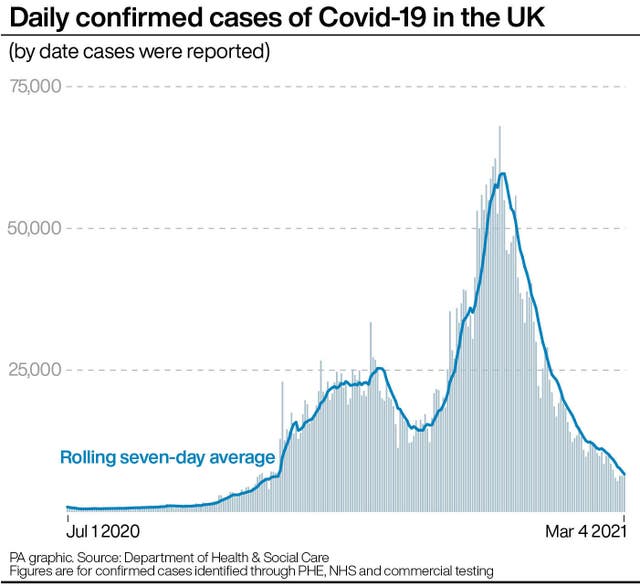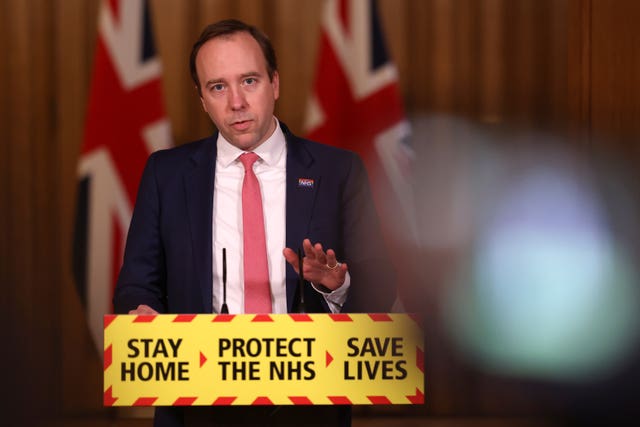Hancock hails ‘encouraging’ data ahead of first stage of lockdown easing
Matt Hancock said the data meant the Government would press on with plans to lift the lockdown.

The average daily number of Covid cases, hospital admissions and deaths are the lowest they have been since the autumn, according to the Health Secretary.
Matt Hancock painted a positive picture regarding the state of coronavirus infections in England in a press conference on Friday, with the average number of cases – 6,685 per day – at their lowest rate since late September.
That pattern was repeated on Friday, with the Government confirming that, as of 9am, there had been a further 5,947 lab-confirmed cases of Covid-19 in the UK.
The Health Secretary said the decrease in cases meant the Government could continue with its plan of replacing the lockdown – with the first easing on Monday with the return of schools, and all restrictions possibly scrapped by June 21 – with the “protection that comes from vaccines and regular testing”.
More than one million people in the UK have now received both doses of a Covid-19 vaccine, while almost 21.4 million people have had one dose.
And from Saturday, businesses of all sizes, including those with fewer than 50 employees, will be able to register to order lateral flow tests, which can produce results in less than 30 minutes, for their workers.
Announcing the “encouraging news” about the Covid data, Mr Hancock said the fall in the average number of admissions to hospital, down to 900 per day, and a “steeply” declining average daily death rate, down to 248, meant both were at their lowest levels since October.

Mr Hancock said there are still 12,136 people in UK hospitals with Covid-19, which is “too high”, but that the data was evidence “we’re heading in the right direction”.
There was further good news as a scientist heading the body tracking new variants of coronavirus said she was “optimistic” about the UK “staying ahead” of the virus’ developments via adapted vaccines.
Professor Sharon Peacock, head of the Covid-19 Genomics UK, told The Times new variants were “very unlikely to send us back to square one”.
It comes as the mystery sixth case of the Manaus variant of coronavirus was confirmed as having been tracked down and identified to Croydon in south London.

Mr Hancock said the “dogged determination” of testing and tracing teams had found the person, who had been staying at home after returning from Brazil.
He said: “The best evidence is that this person stayed at home and there is no evidence of onward transmission but as a precaution we are putting more testing in Croydon where they live to minimise the possibility of spread.”
Mayor of London Sadiq Khan urged residents in Croydon to “come forward” for a test, regardless of having symptoms or not.
Officials had been hunting for the unknown individual after cases of the variant of concern were detected in the UK.
Six cases of the P1 variant, first identified in the Brazilian city of Manaus, have been found – three in Scotland and three in England.
There is mounting evidence to suggest the Manaus mutation, along with the South African variant, may be able to more easily evade the vaccines currently being rolled out in Britain.
With the improving picture in terms of cases, senior Conservative MPs questioned why ministers were following through with more stringent foreign travel measures.
From Monday, people travelling internationally from England will need to complete and carry a declaration to travel document downloaded from the Government’s website.
Those who fail to comply with the measure – first announced 40 days ago – face being fined £200, with holidays banned under the current lockdown rules.
But speaking to The Daily Telegraph – which suggested the move was aimed at curtailing foreign trips at Easter – Sir Graham Brady said the imposition gave “too much control to the state”.
The chairman of the influential 1922 Committee of backbench Tories told the paper: “With the progress of the vaccine programme and the real fall of positive tests for Covid in the UK, it’s time that we were starting to get rid of intrusive regulations, not bringing in new ones.”





